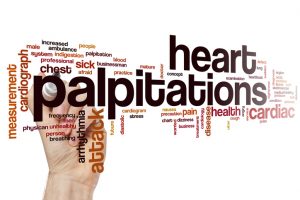
Heart palpitations can be harmless and merely a response to activity, stress, etc. But in some cases, heart palpitations can be the sign of a serious condition. When it comes to matters of the heart, it’s best to be on guard to help prevent any serious illness.
Causes and symptoms of heart palpitations
Causes of heart palpitations can be minor or serious, depending on whether it’s a response or an actual symptom. Here are some causes of heart palpitations:
- Response to emotion – stress, anxiety
- Exercise
- Caffeine
- Nicotine
- Fever
- Changes to hormones
- Cold and flu medications
- Asthma inhalers that contain stimulants
Many of these causes are a response to changes in the body. However, as mentioned, heart palpitations can be a symptom of other problems. Heart palpitations are associated with hyperthyroidism and arrhythmia (abnormal heart rate).
If you experience the below severe symptoms, you should seek medical attention right away.
- Loss of alertness
- Shortness of breath
- Dizziness or lightheadedness
- Chest pain
- Unusual sweating
If you are at high risk for heart disease and experience heart palpitations, once again, seek medical attention.
The main symptom of heart palpitations are variations in heartbeat. Heart palpitations may feel like a fluttering in your heart, a rapid heartbeat, skipping a beat, and a beat which is pumping harder than normal.
Risk factors for heart palpitations
Certain factors will increase a person’s risk of experiencing heart palpitations. These include:
- Being overly stressed
- Having an anxiety disorder or panic attacks
- Being pregnant
- Taking medications that contain stimulants
- Hyperthyroidism
- Having a heart defect or an arrhythmia
Heart palpitations after eating and when lying down
Heart palpitations are a sensation that your heart is beating too quickly or feels like it is fluttering. This can be felt in your chest, throat, or neck. Although anyone can feel heart palpitations after a meal, it is more commonly experienced in obese or anorexic individuals.
A common cause of heart palpitations after eating is the fact that the meal was simply too large. You may also experience heart palpitations after a meal if the meal contained high amounts of carbohydrates, sugar, or fat. Foods high in monosodium glutamate (MSG), nitrates, or sodium can also cause heart palpitations. In order to narrow down which foods lead to your heart palpitations, it may be helpful to document your eating in a diary for a week or so.
Lying down, too, can cause your heart to flutter. Causes for heart palpitations when lying down include:
- Caffeine
- Smoking
- Stress, anxiety, panic attack
- Heart disease
Heart palpitations may worsen if a person specifically lies down on their left side. There are many reasons for this, including:
- Lying down changes the demands of the body, and lying on the left side puts the heart in closer proximity with the chest and ribs.
- Lying on the left side compresses the stomach and the left lobe of the lung and heart.
- Lying down after a meal can lead to heart palpitations because circulation increases, so there is a higher demand from the heart.
Heart palpitations at night
For some, heart palpitations may only occur at night. That is only because they may be more noticeable at night, when you are relaxed.
Heart palpitations at night may also be caused by the way you sleep. Certain positions apply pressure to the vagus nerve, which is responsible for controlling heart rate, among other functions.
Lastly, heart palpitations at night can also be a result of consuming a large meal prior to bed and not digesting it properly.
Treatment and prevention of heart palpitations
Generally, heart palpitations are not a serious condition, so treatment is not required. Unless the heart palpitations are associated with a defect, arrhythmia, hyperthyroidism, or other heart problems – then your doctor will suggest treatment.
In order to best treat heart palpitations, it’s important to know the underlying cause. If you mainly experience heart palpitations while exercising, then consider a less strenuous form of activity. If you are experiencing heart palpitations due to stress, practice stress reduction techniques, like exercise, yoga, or meditation.
You can also treat heart palpitations at home by reducing your intake of stimulants like caffeine and nicotine. Check medications for hidden stimulants as well – your doctor may be able to offer you an alternative.
- Keep a log of your activities, as well as the foods and beverages you eat.
- Don’t smoke or use tobacco products.
- Stick to a healthy diet.
The key to treating heart palpitations is to know the root cause – if at any time symptoms worsen, you should visit your doctor.